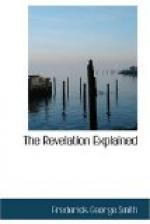It may appear at first that making the conversion of water into blood a symbol of bloodshed is adopting the literal method of interpretation; but not so, and for the following reason: The symbol is taken from nature, the waters of the sea representing the inhabitants of the kingdom. The waters are changed into an unnatural state or element, that of blood, and this change denotes an analagous one passing upon the inhabitants. Their continuing in life would be their remaining as waters: their massacre and destruction would be the waters changed to blood—a horrible and unnatural element. Likewise, the death of the living things in the sea is a similar destruction overtaking the kings, rulers, and princes.
With our understanding of the nature of the first vial, which prepared the way for the pouring out of this one, we shall have no difficulty whatever in identifying this symbol with the terrible convulsions of the French Revolution. It followed as a necessary consequence of the first. Voltaire and his coadjutors had insulted and trampled in the dust everything held sacred in human eyes, and this fully prepared the way for the scenes of terror that followed.
In studying these vials the reader should bear in mind constantly the reason why they were sent as judgments upon the nations of Europe—because of their former oppression of God’s people. From the days when the Popes received their first temporal authority at the hands of the Carlovingian king, Pepin and Charlemagne, France[11] constituted the real backbone of the Papacy, the very center of her power and authority, as all history will show. In the fourteenth century the Papal seat was removed from Rome to Avignon, in France, where it remained for about seventy years. During this period all the Popes were French, and “all their policies were shaped and controlled by the French kings.” To write a history of the Papacy during the Dark Ages is to outline the history of France, so closely are their affairs interwoven. Hence it is only natural that she should be symbolized as the “sea” in this part of the Apocalypse, with the other nations as tributaries. Ver. 4-6. That the French Revolution was in its effects a terrible blow to the thrones of despotism throughout Europe is shown by the following quotation from the Encyclopaedia Britannica: “We are coming to the verge of the French Revolution, which surpasses all other revolutions the world has seen in its completeness, the largeness of its theatre, the long preparation for it ... its influence on the modern history of Europe.” Art. France.




